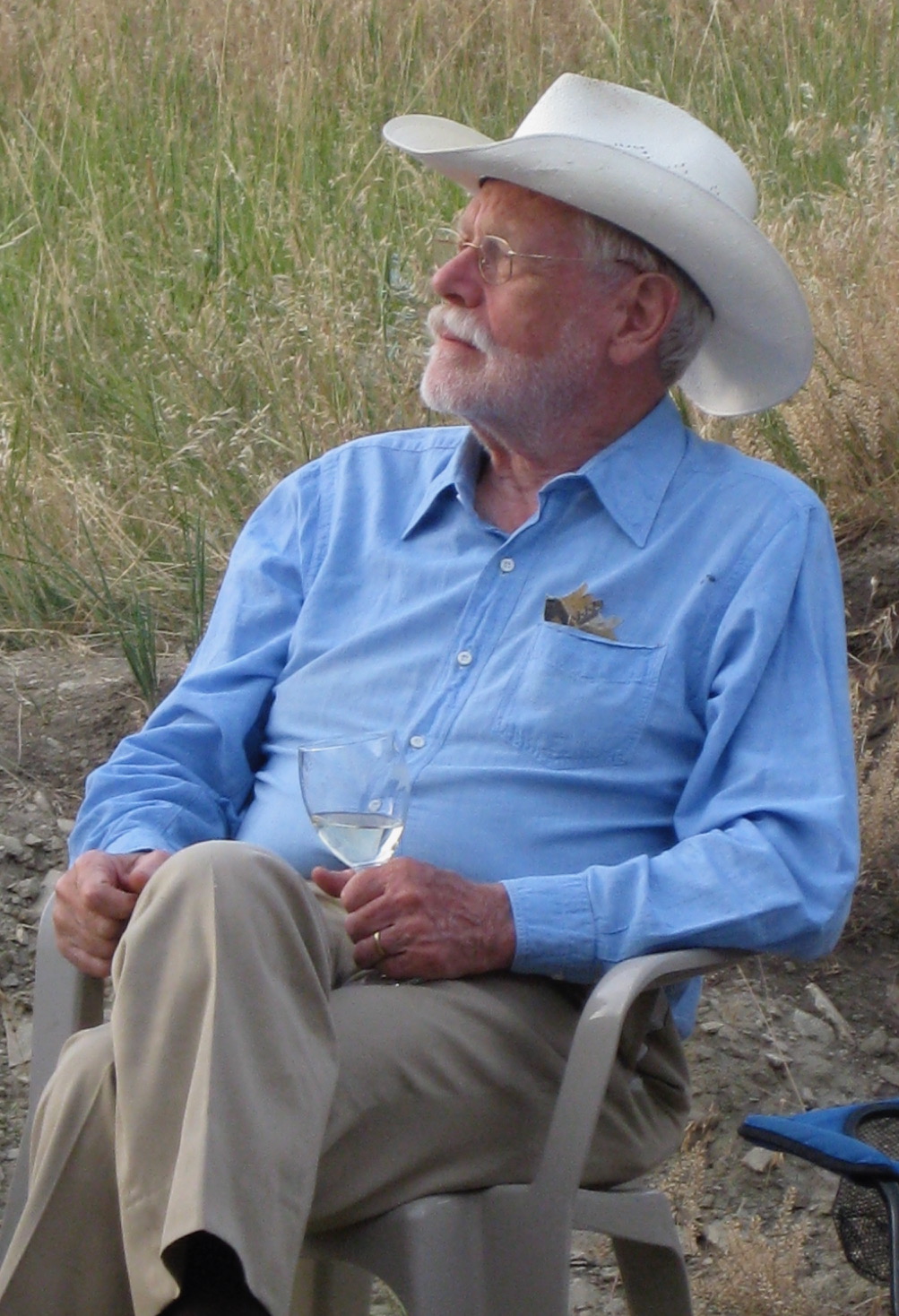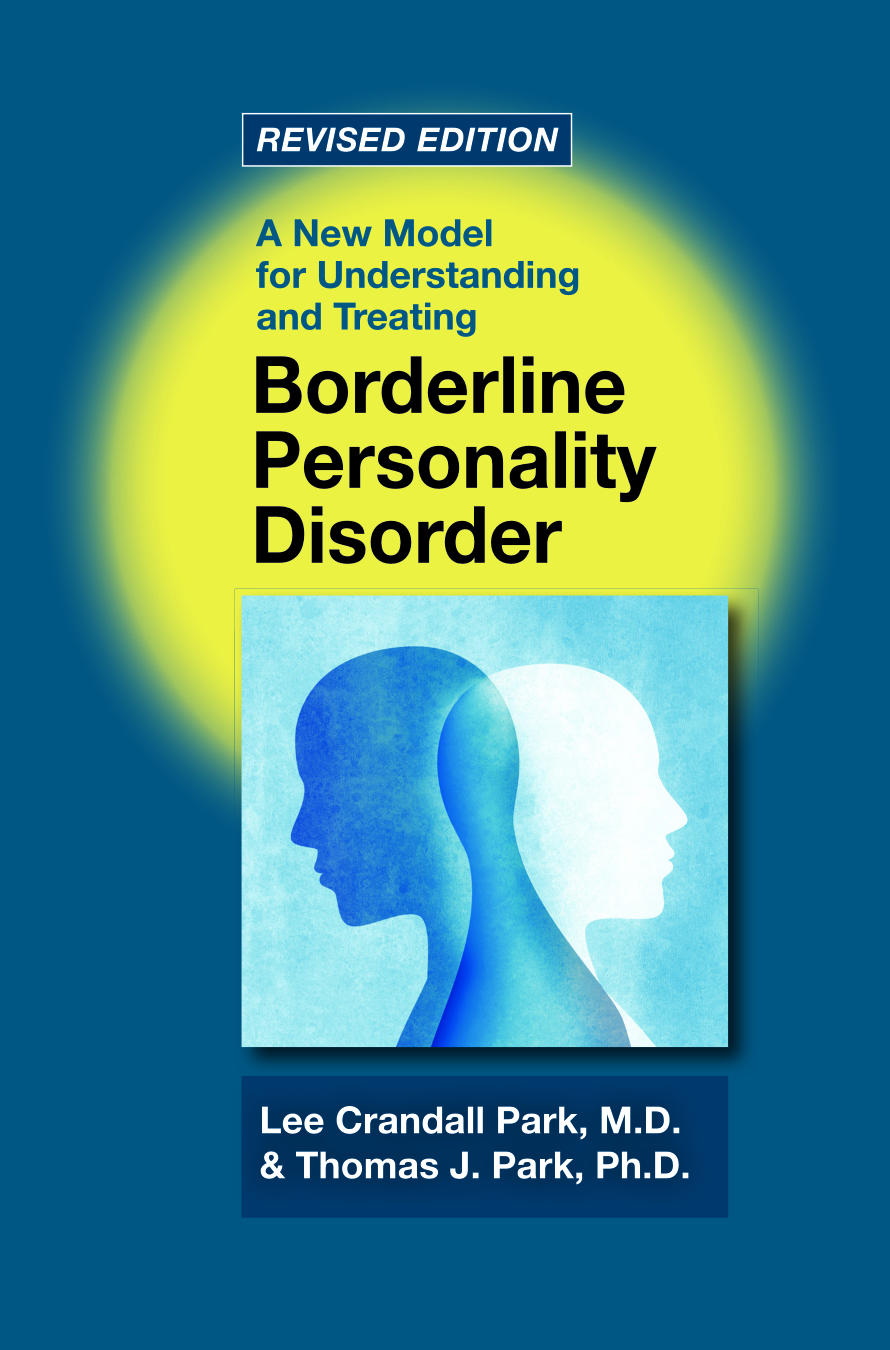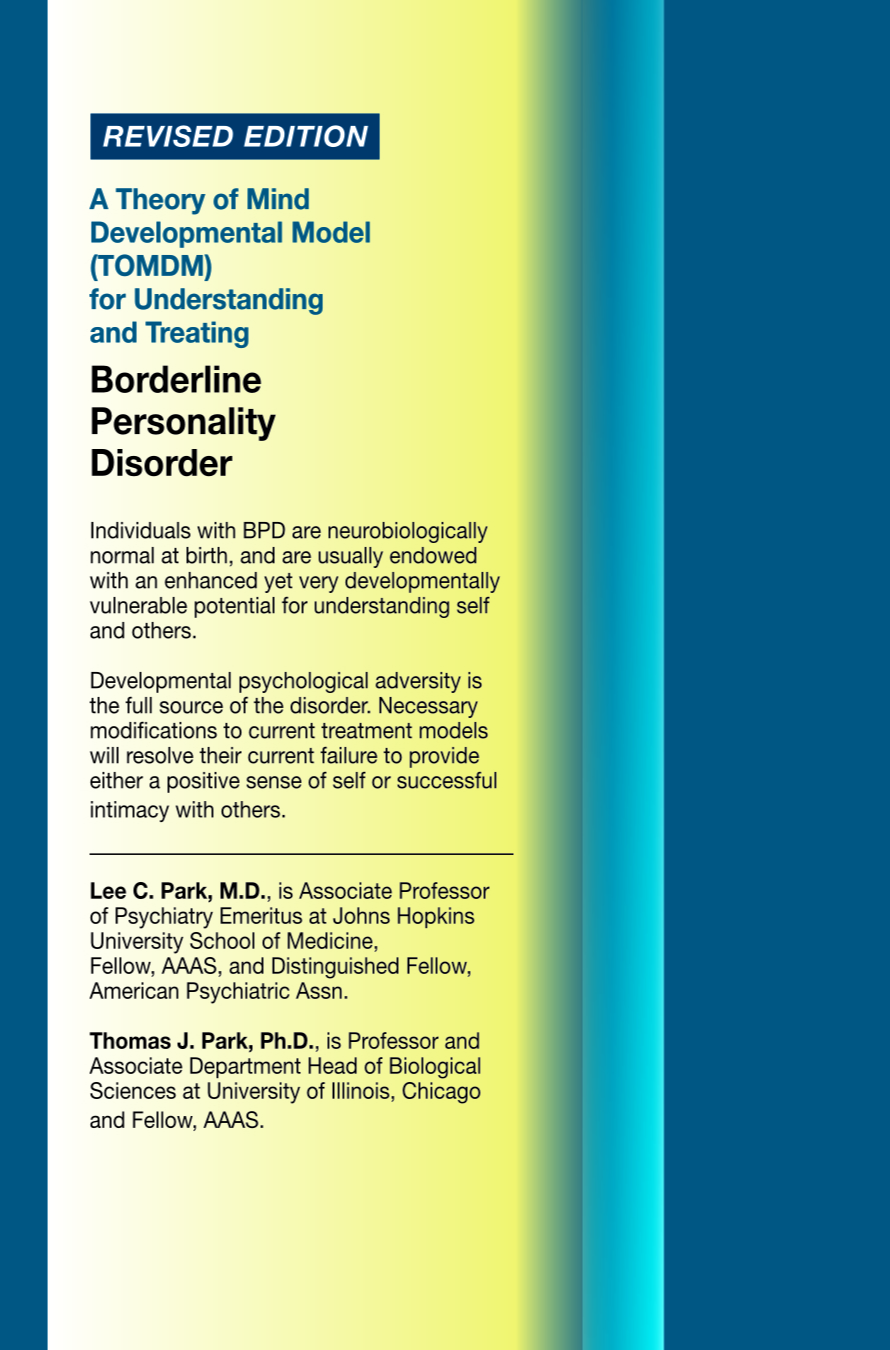Lee Crandall Park, M.D.
Veritas vos liberabit
(The truth will make you free)
— motto of Johns Hopkins University

About
Lee Crandall Park, M.D.
This summary has been revised to be more of a “memoir” now that I am 98 years old. I am Associate Professor of Psychiatry Emeritus at Johns Hopkins University School of Medicine. I am a Life Fellow AAAS and Distinguished Life Fellow of the American Psychiatric Association. I was active in psychiatric practice and research for over 55 years, and since retiring in 2015 at the age of 89 I have had more time to read the research literature as well as to organize and reread years of notes that are relevant to the following Monograph on Borderline Personality Disorder.
I began experiencing Dyslexia at an early age, completing elementary education at a local public school with only a C average. My son, Thomas, is also dyslexic, and we both have had to make extra efforts to succeed scholastically and professionally. (Quite paradoxically, my other son, Jeffrey, is an excellent linguist.) I was fortunate to be accepted by the Putney Preparatory School beginning in the 9th grade, and following this wonderful educational experience I graduated from Yale University in 1948 with a B.S. in Zoology and from Johns Hopkins School of Medicine in 1952. I was an Osler Intern in Internal Medicine at Johns Hopkins Hospital 1952-53, at a time when antipsychotic and other drugs for mental illness were soon to become generally available. Following internship, I was called into the Navy for two years. Due to a clerical error, I was incorrectly assigned to be a staff psychiatrist at the Oak Knoll Naval Hospital in Oakland, California. This was the receiving hospital for Korean War Naval and Marine casualties, including mental breakdowns, and there was a shortage of psychiatrists there. Therefore I was not reassigned but remained on the staff as a “resident in training” although there was no such program. I was actually working as a regular psychiatrist with the option for advice and support. After a few months I was transferred to Korea to be a regimental surgeon in the First Marine Division Expeditionary Force as the Korean War was coming to a close. Shortly thereafter the Division Psychiatrist became ill and I was then assigned to that position. This was a high stress situation in which there were about 30,000 battle-hardened warriors, with myself being the “psychiatrist” who had almost no formal education or training in mental illness and psychotherapy. I was on my own, with a “psychologist” having a BA degree as my assistant, along with a friendly Marine Captain who had some experience in counseling troubled and sometimes quite disturbed men. I introduced myself to patients in uniform as a pleasant, steady and confident medical officer and psychiatrist who had all the time in the world to get to know another person. I made clear that I wanted to engage personally and seriously in learning about and helping to resolve what had been happening, what might be troubling them, and any other concerns or life experiences they might wish to talk about. To my great surprise I was quite successful in this endeavor, including dealing with crisis situations that involved psychotic and dangerous patients, and I subsequently received a Letter of Appreciation for “Outstanding Performance of Duty” from the Commanding Officer.
This very positive experience in the field of mental illness and its treatment led to my completing a residency at Johns Hopkins Department of Psychiatry and Behavioral Sciences after leaving the Navy. Despite the prior involvement in evaluating and treating Marines in acute life situations, I felt very much a neophyte when I began my residency, largely because I was intimidated by the formal psychiatry guidelines and the somewhat esoteric teachings of psychoanalysis. I also engaged in a psychoanalysis with Sarah Tower, which was beneficial, but some of the learning experiences and confidence that I had gained in Korea temporarily faded away. I did not understand until much later that in Korea I had been experiencing the essence of successful psychotherapy for almost all of my patients as the nature and characteristics of the interpersonal engagement, and that this can be successful even in the absence of the specific guidelines and procedures of various psychotherapies.
Following residency, I became a full-time faculty member at Johns Hopkins School of Medicine. I began working in the psychiatry outpatient program at the hospital, and subsequently I was also placed in charge of mental health counseling for both students and faculty at the George Wilson Shaffer Student Health Service on the Homewood campus of Johns Hopkins University. I was initially quite uneasy when engaging with faculty members, most of them brilliant academics, until I gradually learned that one’s Social Intelligence talent for understanding self and one’s others can be quite independent from other talents. A high IQ could lead to more complex stories, but the underlying ToM difficulties did not differ in significant ways from those of the Marines seen in Korea. Beginning in 1959 I became involved in researching psychiatric drugs in a collaborative program with the NIMH Psychopharmacology Service Center headed by Jonathan Cole, who subsequently became Professor of Psychiatry at Harvard. Our research had to do largely with examining the effects of the doctor’s verbal and emotional communications in addition to drug effects. I also carried out, jointly with Lino Covi, the “Nonblind Placebo Trial” published in Archives of General Psychiatry in 1965, in which 15 new outpatients with psychoneuroses were clearly informed that capsules prescribed for them contained no medicine at all. They were advised that these pills should be taken regularly, three times a day at meals, and they were told that many people with their kind of condition had been helped by such pills (which was true). Each of these patients was provided with a lengthy, quite positive initial evaluation with the prescribing doctor. Fourteen patients willingly entered this brief trial and all but one reported significant improvement, demonstrating that patients can be willing to take placebos and can improve despite disclosure of their inert content. (The patient who did not improve was also feeling better until her husband ridiculed her for taking “sugar pills”.) This was the first reported study ever that revealed to the patient that pills prescribed had no active content, and it had required a special review by the Chairman and other members of the Department prior to proceeding. The result is in alignment with my belief and experience that the development of a genuine, positive, and appropriately personal engagement, of necessary duration, is an essential characteristic of successful treatment for most or almost all patients with mental illness, and often can be more important than the specifics of the diverse treatment concepts and theories themselves. This study was reported in numerous newspapers in the US and other countries.
My thinking about the sources, nature and treatments of mental illness has evolved over the course of the many years that I have been a psychiatrist, during which I have been influenced by differing schools of thought, including particularly Meyerian (Adolf Meyer), Psychoanalysis, DBT, and the current Medical Model. This varied history, along with my experiences in Korea, has helped in thinking outside of the box. For a time I was Director of Psychiatric Outpatient and Community Services at Johns Hopkins Hospital, but by then I was becoming disappointed with the increasingly narrow theoretical and research focus on finding inborn neurobiological flaws that could lead to mental illness, along with the decreasing interest in examining the nature of the childhood/adolescent developmental social experiences as likely critical to the proper development and workings of the mind. As I gradually moved into part-time and then full-time private practice I developed a strong interest in Personality Disorders, particularly Borderline and Narcissistic Disorders. I have had the opportunity to treat and then follow several borderline patients for up to 40 years, providing a rather special experience. In 1992 we reported a study of BPD that focused on histories of childhood psychological abuse and the evidence of enhanced social perceptivity. Co-authors included John B. Imboden M.D. past Director of the Psychiatric Inpatient Service at Johns Hopkins Hospital, Thomas J. Park Ph.D., currently Professor of Neuroscience and Associate Department Head of Biological Sciences at the University of Illinois, Chicago, and Stewart H. Hulse Ph.D., Chair of the Psychology Department at Johns Hopkins University. In 1997 Thomas Park and I also co-authored a book chapter on “Personal Intelligence” and its likely involvement in BPD. We have now co-authored a monograph, “A New Model for Understanding and Treating Borderline Personality Disorder”.
In completing this monograph as a “memoir” of a long professional life, I am thinking of the words of Horace Mann: “Be ashamed to die until you have won some victory for humanity.”
12-12-24
Website: leecrandallparkmd.net
E-mail: lpark3@jhmi.edu

(motto of Johns Hopkins Medicine)
Sir William Osler,
Knighted in 1911
CURRICULUM VITAE
EDUCATION
1944
Grad. Putney Preparatory School, Putney, VT.
1948
B.S., Yale University (Zoology).
1952
M.D, Johns Hopkins University School of Medicine.
1952-1953
Intern in Medicine, Osler Service, Johns Hopkins Hospital.
1953-1955
Medical Officer USNR: Psychiatric Resident and Hospital Staff Psychiatrist; Regimental Surgeon and Division Psychiatrist, 1st Marine Division Korea. (Letter of Appreciation, Commanding Officer, “Outstanding Performance of Duty”). Medals: Korean Service, National Defense Service, United Nations
1955-1959
Psychiatric Residency, Henry Phipps Psychiatric Clinic, Johns Hopkins Hospital; Post Doctoral Fellow in Johns Hopkins University.
Diplomate National Board of Medical Examiners. Licensed Maryland and California.
Certified by American Board of Psychiatry and Neurology in Psychiatry.
POSITIONS
1959 -2009 Faculty, Department of Psychiatry and Behavioral Sciences, Johns Hopkins University School of Medicine. Associate Professor 1970 to present (Emeritus since 2009).
1961 – 1973 Physician in charge of Psychiatric Services, Student Health Service, Johns Hopkins University.
1964 – l981 Psychiatric Consultant, Office of Disability Programs, Social Security Administration.
1966 -1973 Attending Staff, Seton Psychiatric Institute. (Executive Coordinating Board l970 -l973).
1970 – 2009 Staff (Associate to Honorary), Department of Medicine, Johns Hopkins Hospital.
1972 -1974 Director, Psychiatric Outpt. Services & Community Psych. Program, Johns Hopkins Hospital.
1974 – l976 Departmental Council, Dept. of Psychiatry and Behavioral Sciences, Johns Hopkins Hospital.
1974 – 2015 Full-Time Private Practice of Psychiatry (Individual, Group, Marital, Family Therapy; Adolescents, Adults).
1974 -1976 Psychiatrist Consultant, University of Notre Dame, Baltimore.
1974 – 2002 Courtesy Staff and Preferred Psychiatrist Affiliate, Dept. of Psychiatry and Medicine, Sheppard and Enoch Pratt Hosp.
1981 – 1986 Clinical Faculty, Dept. of Psychology and, Counseling and Psychiatric Services, Johns Hopkins University, Homewood.
MEMBERSHIPS
• American Psychiatric Association: Distinguished Life Fellow; Member Assembly of District Branches 1983-1993; APA Nominating Committee 1990-1991; Consultant to APA Task Force on Treatments of Psychiatric Disorders 1989; Reviewer, American Journal of Psychiatry 1978-1994.
• American Medical Association.
• American Psychosomatic Society. (Now Society for Biopsychosocial Science and Medicine)
• American College of Neuropsychopharmacology.
• American Association for the Advancement of Science (Life Fellow).
• American Association of University Professors.
• Maryland Psychiatric Society (President l978-1979).
• Maryland Foundation for Psychiatry (Board Director 1995-2003; President 2000-2003 ).
• Maryland Interdisciplinary Council for Children and Adolescents (1978-1998)
• Medical and Chirurgical Faculty of the State of Maryland.
• New York Academy of Sciences.
• Baltimore City and Baltimore County Medical Societies.
• Johns Hopkins Medicine Alumni Association.
RESEARCH
- Participant in Dr. Jerome Frank’s study of placebo effect: 1959.
- Co-Principal Investigator: Controlled Study of the interaction of Therapists’ Personal Characteristics and of Medication (imipramine, placebo) in the Treatment of Depression, USPHS Grant M-3741A: l959-1960. (With E.H. Uhlenhuth, M.D.)
- Methionine Ingestion in Schizophrenic Patients treated with Monoamine Oxidase Inhibitors, USPHS Grant MH-5521: l96l-l962. (With S.S. Kety, M.D. and R.J. Baldessarini, M.D.)
- Principal and Co-Principal Investigator: NIMH-PRB Outpatient Study of Drug-Set Interaction, USPHS Grant MH-04732: 1960 1968. (With E.H. Uhlenhuth, M.D. and L. Covi, M.D.)
- Co-Project Director: A controlled Study of Time-Limited Psychotherapy, USPHS Grant MH-16056: l969-1973. (With E. Meyer, M.D.)
- Clinical research of Borderline and Narcissistic Conditions: Etiology, Characteristics and Treatment.
- Psychiatric Research Network, American Psychiatric Assn: 1994-2002.
BIBLIOGRAPHY
This bibliography is available as a PDF.
HIGHLIGHTS
- Park, L.C. and Covi, L. “Non-blind placebo trial: An exploration of neurotic patients’ responses to placebo when its inert content is disclosed.” Arch. Gen. Psychiat. 12:336-345, l965. https://doi.org/10.1001/archpsyc.1965.01720340008002 | Download as PDF
PLACEBO TRIAL ARTICLE REVIEWS AND COMMENTS – 1965-67
- “Expectancies in psychotherapy influence ultimate outcome,” Roche Report: Frontiers of Clinical Psychiatry, Nutley, NJ, July 1, 1965. | Download as PDF
- “The Misuse of Happy Pills,” Better Homes and Gardens, April 1967. | Download as PDF
- “Johns Hopkins MDs Explore ‘Placebo Effect; 14 Patients Swear Sugar Pills Were Curative,” Drug Topics, May 17, 1965. | Download as PDF
- “Editorial #1: Happiness is a Pink Pill,” WWDC Broadcast, June 22, 1965. | Download as PDF
- “Nonblind Placebo Trial,” Associated Press Teletype,1965. | Download as PDF
- “A Bizarre Demonstration,” Baltimore News-American, June 17, 1965. | Download as PDF
- “Patients Knowingly Take Fake Pills, Still Feel Better,” Baltimore Sun, June 16, 1965. | Download as PDF
- Collection of 27 articles about the placebo trials from various newspapers, 1965 | Download as PDF
- Park, L.C., Imboden, J.B., Park, T.J., Hulse, S.H. and Unger, H.T. “Giftedness and psychological abuse in borderline personality disorder: Their relevance to genesis and treatment.” Journal of Personality Disorders, 6: 226-240, 1992. https://doi.org/10.1521/pedi.1992.6.3.226 | Download as PDF
- Park, L.C. “Does this patient need psychiatric referral? Borderline personality disorder is serious, life-threatening, and fairly common, yet it goes unrecognized by most physicians.” Hospital Medicine, 30: 36-42, l994. [Reprinted in Tiempos Medicos.] | Download as PDF
- Park, L.C. and Park, T.J. “Personal Intelligence.” In McCallum, M. and Piper, W.E. (eds.) Psychological Mindedness: A Contemporary Understanding, Chapter 6, pp. 133-167, 1997 Lawrence Erlbaum Associates, Inc., Mahwah, NJ | Download as PDF
- Park, L.C. “Psychiatry at Johns Hopkins Hospital.” In The Maryland Psychiatric Society: Celebrating 50 Years, pp 36, 42, Maryland Psych. Soc., Baltimore, 2000. | Download as PDF
BOOKS
- Park, L. C. and Park, T.J., A New Model for Treating Borderline Personality Disorder, Revised Edition, Herron Creek Press LLC, 2024. | See More Information
- Allen, T.E., Liebman, M.C., Park, L.C., and Wimmer, W.C., A Primer on Mental Disorders: A Guide for Educators, Families, and Students, Scarecrow Press, Lanham, MD, 2001. | Via Amazon as Kindle, Hardcover, and Paperback
OTHER PUBLICATIONS
1. Uhlenhuth, E.H. and Park, L.C. “The influence of medication (imipramine) and doctor in relieving depressed psychoneurotic outpatients. ” J. Psychiat. Res. 2:101-122, 1964. https://doi.org/10.1016/0022-3956(64)90006-8 | Download as PDF
2. Park, L.C. and Lipman, R.S. “A comparison of patient dosage deviation reports with pill counts.” Psychopharmacologia 6:299 302, l964. https://doi.org/10.1007/bf00413160 | Download as PDF
3. Fisher, S., Lipman, R.S., Uhlenhuth, E.H., Rickels, K. and Park, L.C. “Drug effects and initial severity of symptomatology.” Psychopharmacologia 7:57-60, l965. https://doi.org/10.1007/bf00404165 | Download as PDF
4. Lipman, R.S., Hammer, H. M., Bernardes, J.F., Park, L.C. and Cole, J.O. “Patient report of significant life situation events: Methodological implications for outpatient drug evaluation.” Dis. Nerv. Syst. 26: 586-591, l965. | Download as PDF
5. Park, L.C., Baldessarini, R.J. and Kety, S.S. “Methionine effects on chronic schizophrenics: Patients treated with monoamine oxidase inhibitors.” Arch. Gen. Psychiat. 21:346-351, l965. https://doi.org/10.1001/archpsyc.1965.01720340018003 | Download as PDF
6. Uhlenhuth, E.H., Park, L.C., Lipman. R.S., Rickels, K., Fisher, S. and Mock, J.E. “Dosage deviation and drug effects in drug trials.” J. Nerv. Ment. Dis. 141:95-99, l965. https://doi.org/10.1097/00005053-196507000-00009 | Download as PDF
7. Park, L.C., Uhlenhuth, E.H., Lipman, R.S., Rickels, K. and Fisher, S. “A comparison of doctor and patient improvement ratings in a drug (meprobamate) trial.” Brit. J. Psychiat. 111:535-540, l965. https://doi.org/10.1192/bjp.111.475.534 | Download as PDF
8. Lipman, R.S., Cole, J.O., Park, L.C. and Rickels, K. “Sensitivity of symptom and nonsymptom-focused criteria of outpatient drug efficacy.” Amer. J. Psychiat. 122:24-27, l965. https://doi.org/10.1176/ajp.122.1.24 | Download as PDF
9. Lipman, R.S., Rickels, K., Uhlenhuth, E.H., Park, L.C. and Fisher, S. “Neurotics who fail to take their drugs.” Brit. J. Psychiat. lll: 1042-1049, l965. https://doi.org/10.1192/bjp.111.480.1043 | Download as PDF
10. Uhlenhuth, E.H., Rickels, K., Fisher, S., Park, L.C., Lipman, R.S. and Mock, J.E. “Drug, doctor’s verbal attitude and clinic setting in the symptomatic response to pharmacotherapy.” Psychopharmacologia 9:392-418, l966. https://doi.org/10.1007/bf00406450 | Download as PDF
11. Lipman, R.S., Park, L.C. and Rickels, K. “Paradoxical influence of a therapeutic side-effect interpretation.” Arch. Gen. Psychiat. 15:462-474, l966. https://doi.org/10.1001/archpsyc.1966.01730170014004 | Download as PDF
12. Park, L.C., Slaughter, R., Covi, L. and Kniffin, H.C., Jr. “The subjective experience of the research patient: An investigation of psychiatric outpatients’ reactions to the research treatment situation.” J. Nerv. Ment. Dis. 143:199-206, l966. https://doi.org/10.1097/00005053-196609000-00001 | Download as PDF 1 | Download as PDF 2
13. Rickels, K., Snow, L., Uhlenhuth, E.H., Lipman, R.S., Park, L.C. and Fisher, S. “Side reactions on meprobamate and placebo.” Dis. Nerv. Syst. 28:39-45, l967. PMID 5334842 | Download as PDF 1
14. Park, L.C., Covi, L. and Uhlenhuth, E.H. “Effects of informed consent on research patients and study results.” J. Nerv. Ment. Dis., l45:349-357, l967. https://doi.org/10.1097/00005053-196711000-00001 | Download as PDF 1 | Download as PDF 2
-
INFORMED CONSENT ARTICLE REVIEWS AND COMMENTS – 1965-67
-
- “Informed Consent,” Sandoz Psychiatric Spectator, Vol. IV, No. 8, May 8-12, 1967. | Download as PDF
- “‘Informed Consent’ Viewed as No Obstacle To Research,” Psychiatric Progress, Vol. 2, No. 4, June 1967. | Download as PDF
- “Effects of Informed Consent on Research Patients and Study Results,” Digest of Neurology and Psychiatry, June-July 1965. | Download as PDF
-
15. Uhlenhuth, E.H., Lipman, R.S., Rickels, K., Fisher, S., Covi, L., and Park, L.C. “Predicting the relief of anxiety with meprobamate: Non-drug factors in the response of psychoneurotic outpatients.” Arch. Gen. Psychiat., 19:619-630, l968. https://doi.org/10.1001/archpsyc.1968.01740110107014 | Download as PDF AGP| Download as PDF CMD
16. Uhlenhuth, E.H., Duncan, D.B. and Park, L.C. “Some nonpharmacologic modifiers of the response to imipramine in depressed psychoneurotic outpatients: A confirmatory study.” In May, P.R.A. and Wittenborn, J.R. (eds.) Psychotropic Drug Response: Advances in Prediction, pp. 155-197, Charles C. Thomas, Springfield, IL., l969. | Download as PDF
17. Covi, L., Park, L.C., Lipman, R.S., Uhlenhuth, E.H. and Rickels, K. “Factors affecting withdrawal response to certain minor tranquilizers.” In Cole, J.O. and Wittenborn, J.R. (eds.) Drug Abuse: Social and Psychopharmacological Aspects, pp. 93-108, Charles C. Thomas, Springfield, IL., l969. | Download as PDF
18. Rickels, K., Howard, K., Lipman, R.S., Covi, L., Park, L.C. and Uhlenhuth, E.H. “Differential reliability in rating psychopathology and global improvement.” J. Clin. Psychol., 26:320-323, l970. https://doi.org/10.1002/1097-4679(197007)26:3%3C320::aid-jclp2270260320%3E3.0.co;2-p | Download as PDF
19. Imboden, J.B. and Park, LC. “Dissociative Reactions.” In Tice’s Practice of Medicine, Vol. 10, Chapter 38, pp. l9-24, Harper and Row, Hagerstown, MD., l970. | Download as PDF
20. Rickels, K., Lipman, R.S., Fisher, S., Park, L.C. and Uhlenhuth, E.H. “Is a double-blind clinical trial really double blind? A report of doctors’ medication guesses.” Psychopharmacologia, 16:329-336, l970. https://doi.org/10.1007/bf00404739
21. Park, L.C. and Imboden, J.B. “Clinical and heuristic value of clinical drug research.” J. Nerv. Ment. Dis., 151:322-340, l970. https://doi.org/10.1097/00005053-197011000-00005 | Download as PDF
22. Rickels, K., Lipman, R.S., Park, L.C., Covi, L., Uhlenhuth, E.H. and Mock, J.E. “Drug, doctor warmth, and clinic setting in the symptomatic response to minor tranquilizers.” Psychopharmnacologia, 20: 128-152, l97l. https://doi.org/10.1007/bf00404367 | Download as PDF
23. Uhlenhuth. E.H., Covi, L., Rickels, K., Lipman, R.S. and Park, L.C. “Predicting the relief of anxiety with meprobamate: An attempt at replication.” Arch. Gen. Psychiat., 26: 85-91, l972. https://doi.org/10.1001/archpsyc.1972.01750190087016
24. Park, L.C. “What limitations should exist on psychiatric evaluations of individuals done for government and other third parties?” The Maryland Psychiatrist, 1:2, l974.
25. Meyer, E., Derogatis, L.R., Miller, J.M. Park, L.C. and Whitmarsh, G.A. “Medical Clinic patients with emotional disorders.” Psychosomatics, 19:611-619,l978. https://doi.org/10.1016/s0033-3182(78)70920-5
26. Meyer, E., Derogatis, L.R., Miller, M.J., Reading, A.J., Cohen, I.H., Park, L.C. and Whitmarsh, G.A. “Addition of time limited psychotherapy to medical treatment in a general medical clinic: Results at one-year follow-up.” J.Nerv. Ment. Dis., 169:780-790, l98l. https://doi.org/10.1097/00005053-198112000-00006
27. Imboden, J.B. and Park, L.C. “Conversion Reactions.” In Spittell, J.A., Jr. (ed.) Clinical Medicine, Chapter 35, pp.l-5, Harper and Row, Philadelphia, PA. l98l. | Download as PDF
28. Park, L.C. and Imboden, J.B. “Dissociative Reactions.” In Spittell, J.A., Jr. (ed.) Clinical Medicine, Chapter 36, pp. l-5, Harper and Row, Philadelphia, PA., l98l. | Download as PDF
29. Park, L.C. “The APA Assembly in Action.” Maryland Psychiatric Society News, 2:2-3, 1988.
30. Park, L.C. “Positive outlook enhances `golden years’.” Senior Digest, 13:18, 1989. | Download as PDF
31. Park, L.C. “Psychiatry ignoring child abuse and neglect movement.” Psychiatric News, 27:14, l992. | Download as PDF
OTHER INFORMATION
Patriotic/Lineage Organizations and Clubs:
- General Society of the War of 1812: President Maryland Society 2004-2006; Surgeon General 2012-2017;
District Deputy President General, 2017-2025 - General Society of Colonial Wars
- National Society Sons and Daughters of the Pilgrims: Maryland Branch: Governor 2006-200
- General Society Sons of the Revolution: State of Maryland Board of Managers 2006-2008; General Surgeon 2015-2018
- National Society of the Sons of the American Revolution: Surgeon General 2009-2011; State of Maryland: Surgeon
- National Huguenot Society: Surgeon General 2005-2008
- The Royal Society of St. George. Saint George’s Society of Baltimore
- The Holland Society of New York: Associate/Friend
- St. Nicholas Society
- Maryland Center for History and Culture (Maryland Historical Society)
- Several Family Associations
Immediate Family
- Spouse: Mary Woodfill Park: Corporate Librarian, Information consultant for business and family history, Author, Genealogist
- Two Sons: Both graduates of Johns Hopkins University:
- Thomas Joseph Park, Ph.D., Tenured Professor of Neuroscience and Associate Head of Department of Biological Sciences, Univ. of Illinois Chicago. His wife is a journalist (retired), Chicago Tribune. 1 child.
- Jeffrey Rawson Park, MA: Coordinator for Scientific English & Intermediate English at George-August University, Goettingen, Germany. His wife has a Masters in Biology and is a researcher at the Max Planck Institute for Multidisciplinary Sciences. 2 children
- Father-Lee I. Park (1895-1978): LL. B. cum laude Univ. of Chicago Law School. Sr. Partner, Hamel, Park, McCabe and Saunders, Washington, DC. World War II: Colonel J.A.G.D. and General Staff
Corps, AUS, 1942-1946 (Legion of Merit, Army Commendation Ribbon). World War I: Cadet 57* Squadron (Bombadier) Air Service, US Army, 1918. www.wwiimemorial.com. Listed in
Marquis Who Was Who in America, Vol 7. Died fishing 1978 at Sioux Charlie Lake of the Stillwater River near family cabin in the Beartooth Mountains of Montana. - Mother-Alice Mary (Crandall) Park (1901 – 2006): Graduate University of Chicago. Author, (5 books), Family Researcher, Genealogist. Member Nat. Soc. Colonial Dames of America, Society Daughters of Holland Dames, Associate Member Holland Society, several other lineage and
patriotic organizations. Listed in Marquis’ Who Was Who in America, Vol. 27. - Family Summer Address:
101 Little Rocky Creek Road
Fishtail, Montana 59028
NEW MONOGRAPH!
A New Model for Treating Borderline Personality Disorder, Revised Edition


A Theory of Mind Developmental Model (TOMDM) for Understanding and Treating Borderline Personality Disorder
Individuals with BPD are neurobiologically normal at birth, and are usually endowed with an enhanced yet very developmentally vulnerable potential for understanding self and others.
Developmental psychological adversity is the full source of the disorder. Necessary modifications to current treatment models will resolve their current failure to provide either a positive sense of self or successful intimacy with others.
Please direct all correspondence and book requests to:
LPark3@jhmi.edu (Paperback book will be mailed free if requested here)
Library of Congress Control Number 2023915725
ISBN 979-8-218-35544-9
Authors:
Lee C. Park, M.D., is Associate Professor
of Psychiatry Emeritus at Johns Hopkins
University School of Medicine,
Fellow, AAAS, and Distinguished Fellow,
American Psychiatric Assn.
Thomas J. Park, Ph.D., is Professor and
Associate Department Head of Biological
Sciences at University of Illinois, Chicago
and Fellow, AAAS.
tpark@uic.edu
Published for the authors by
Heron Creek Press, LLC P.O. Box 207
Phoenicia, NY 12464
www.heroncreekpress.com
Extended Abstract
Monograph
